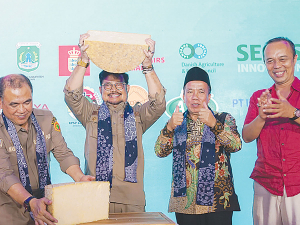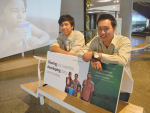Production of the first ever locally-produced organic cheese was celebrated in Indonesia recently.
The cheese is the tangible result of a project bringing together Danish agricultural expertise with local Indonesian partners to improve the Indonesian dairy sector and showcase the opportunities within organic dairy farming.
Production lines started running last month on the first-ever Indonesian organic cheese, a milestone for the dairy sector in the island country with a population of 273 million. The cheese, produced by local artisanal manufacturer Mazaraat Artisan Cheese, has been aided by a Danida-funded project aiming to unlock the potential of organic production in Indonesia and increase local dairy farming efficiency.
"It is a very joyous occasion to see the production commence. With the pandemic, a local outbreak of foot and mouth disease, and supply chain disruptions, this project has been hit with several challenges along the way.
"But with the determination of all the partner involved, and with the support from the Indonesian government, we have been able to deliver on this very impactful project," says executive vice president of agriculture, sustainability and communication at Arla Foods, Hanne Søndergaard.
Participating in the celebration of production starting in Malang, the Director General of Indonesia's Ministry of Agriculture, Dr. Nasrullah said this was a great move for the Indonesian dairy industry and for the entire food production sector.
"We have ambitious plans in place and we need to implement the best practices and newest knowledge to succeed and we do that by collaborating in projects like these. I am very much looking forward to following how this will positively impact our local production going forward."
Following research trips to Denmark in 2018 and 2019, where delegations of representatives from the Indonesian government and leading farmers from the smallholder cooperative KPSP gained insights about organic dairy production, a formal partnership was formed.
First step in the project was capacity building and support for the local farmers in the dairy cooperative KPSP as they transitioned from conventional to organic farming. This was carried out by Danish company SEGES Innovation and ICOEL, with support from the Indonesian certification body LeSOS, the NGO Bina Swadaya, and the cooperative itself.
"Converting the first smallholder farms in Indonesia, with only 3-5 cows, from conventional to certified organic dairy production represents a significant step forward. The Indonesian organic standards have to reflect the local context where many of the farms are located in villages, and without fields surrounding the barns. But we have outlined the basics of organic milk production in terms of animal welfare, feed and concentrate production.
"This achievement is a result of a great partnership with KPSP and Bina Swadaya as well as from numerous stakeholders all along the dairy value chain," says Lisbeth Hendricksen, director of innovation from SEGES Innovation.
Indonesian dairy demand is set to increase by 6% in 2023 and with 80% of dairy consumption coming from imported products, there is an evident local interest in becoming more efficient. On top of this, the Indonesian government has set specific targets for organic production, aiming to increase local organic food production from the current 2% to 20% by 2024.
"The Danish food cluster has a long and celebrated tradition of producing organic dairy of the highest quality. In this project, we are combining the expertise and data acquired over decades with local players bringing an entrepreneurial spirit and market knowledge to the benefit of the whole Indonesian dairy sector," says International Chief Consultant at the Danish Agriculture and Food Council, Jeppe Søndergaard Pedersen.
The certified organic milk from the KPSP cooperative is processed by Mazaraat Artisan Cheese at the newly established manufacturing plant in Malang and turned into the first organic cheese in the country.
While the milk volume only amounts to 60 litres per day to begin with, intake is set to increase to 250l per day end of the year and to 6000l per day by 2026. European dairy cooperative Arla Foods, the world’s largest organic dairy producer, contributes with advanced processing expertise and go-tomarket support from its experience working with both the organic category and artisanal cheese.
“With a direct line from increasing yield and quality at the farm level to the dedication and manufacturing skills at Mazaraat Artisan Cheese, this business case has all the components needed to succeed and spearhead the further development of organic dairy production in Indonesia and we are proud to contribute with our expertise,” says managing director for Arla Foods in Indonesia, Vytautas Petronis.
A Proud Moment
Mazaraat Artisan Cheese – established in 2015 with the vision to “establish a specialty cheese ecosystem to fulfil domestic needs and become one of the strongest cheese providers in South East Asia” – has benefitted greatly from the project and is already setting its sights on global success.
“Introducing the first ever organically produced cheese in Indonesia is something we are massively proud of and being part of this project is a fantastic opportunity. An opportunity for us as dairy producer to learn and collaborate with some of the best and as an Indonesian business to help develop our industry and put Indonesian organic dairy on the map,” says Jamie Najmi from Mazaraat Artisan Cheese.
The cheese will be sold locally in hotels, cafés, and restaurants and with the first export agreement to Singapore already in place.


















